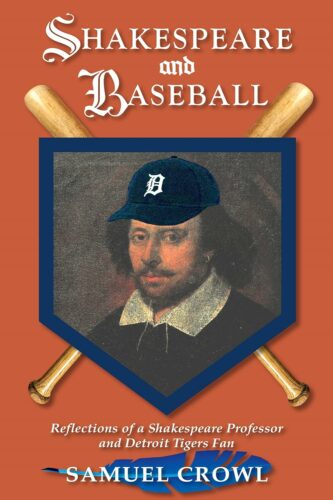Book Review: “Shakespeare and Baseball” — Make “Speed to Catch the Tiger”
By Bill Littlefield
Professor Crowl’s attachments to both Shakespeare’s plays and the play of the Detroit Tigers are sincere and durable.
Shakespeare and Baseball: Reflections of a Shakespeare Professor and Detroit Tigers Fan by Samuel Crowl. Ohio University Special Publications, 217 pages.
 Some books are meant for niche audiences.
Some books are meant for niche audiences.
Shakespeare and Baseball qualifies. The connections between the two subjects represented in the title arise from the passions of Samuel Crowl, who taught and wrote about Shakespeare for many years before retiring. Professor Crowl sometimes wears a Detroit Tigers jersey. Late in his book, the professor asks rhetorically, “What crazy eighty-year-old retired Shakespeare prof wears an Al Kaline shirt?”
There is a revealing passage in Crowl’s book regarding the game that ended the 1968 World Series. Crowl had a class that conflicted with the game. It wasn’t even a class on Shakespeare. That day he would be teaching Homer at the same time Bob Gibson of the Cardinals was facing Mickey Lolich of the Tigers for all the marbles. What kind of Detroit Tigers fan steps to the lecture hall podium to chatter about faithful Penelope and so on while the Tigers are battling for the Championship of the World … or at least the championship of the US and part of Canada?
What sort? Why, as it turns out, the sort represented by Professor Samuel Crowl, who asks, again rhetorically, “Odysseus never phones it in; how could I?”
How? Simple, Professor. Call in sick and watch the game. Happens all the time. Ask any of your former colleagues who love soccer how many classes they miss during the World Cup. You’d have been doing your students a favor. They could have watched the game, too.
Experience had taught Crowl that it might be a long time before he’d see the Tigers in the seventh game of the World Series again. He bailed anyway. And he missed a terrific game, in which Lolich, who always looked more like a guy who maybe owned a diner, rather than a professional athlete, was about to win his third World Series game in two weeks. All he had to do was outpitch Bob Gibson. So he did. And Samuel Crowl had to hear about it later from a friend.
Professor Crowl’s two passions lead him to some charming reaches. He became enamored of Henry IV, Part I while he was still a child when his parents took him to a production. Though his allegiance was to Falstaff, he was not unaware of the virtues of the King’s son, known to his intimates as Prince Hal. Imagine young Crowl’s delight when he discovers that Hal Newhouser, a fine pitcher for the Tigers, is also nicknamed “Prince Hal.” It’s enough to move the professor to celebrate how “baseball and Shakespeare have remained so linked over the past seventy years.”
Which is fine, albeit incomplete. Consider an earlier ballplayer to bear the same moniker, “Prince Hal” Chase. For Chase, the nickname was decidedly ironic, since he was known to pretty much one and all as a guy who’d never been unreceptive to a gambler’s suggestion that he might not be about to have his best day at the ol’ ballpark, and that there would be a wad of cash in it for the prince himself if he struck out when he was asked politely to do so. Sure, Shakespeare’s Prince Hal was something of a rascal in his youth, but for him there were limits. In the aftermath of the one armed robbery in which he was an accessory, Shakespeare’s Hal returned the money. Prince Hal Chase would have kept it. I don’t know about Prince Hal Newhouser.
But no matter. Crowl’s attachments to both Shakespeare’s plays and the play of the Tigers are sincere and durable. He recounts the ups and downs of the ball club, decade by decade, remarking at one point of the aforementioned Al Kaline that “Kaline got me through high school, college, marriage, kids, and graduate school.” How Crowl’s wife and children feel about that assertion is nowhere discussed in Shakespeare and Baseball, though it’s reasonable to assume they must have been a tolerant lot.
Toward the end of his book, Crowl says that he’s surprised “that history has not provided us with a major leaguer named Bill Shakespeare.” It is a little surprising, I guess, given how long the game’s been going on, and that history HAS provided us with at least two major leaguers nicknamed Prince Hal. Another surprise blooms in the final lines of the book, when the professor abandons his beloved Shakespeare altogether and, in celebration of Detroit’s Miguel Cabrera, gives us a paraphrase of William Blake: “Tiger, Tiger, burning bright/In the ballparks of the night.”
He couldn’t have come up with a tiger reference from The Bard?
Bill Littlefield’s most recent novel is Mercy, from Black Rose Writing.

Did he mention Edmund Keane and Harvey Kuenn?